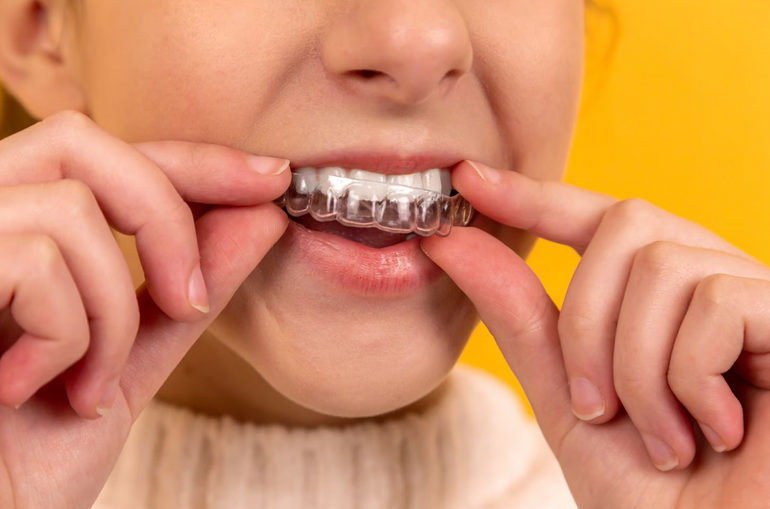
Straight Teeth, No Metal: Clear Aligners That Won’t Cramp Your Style
So you feel like your teeth are such a mess, with one tooth pushing each other, making your smile look crooked. You just don’t like the idea of putting on metal braces and have to deal with it for years. Well, you can now have your teeth straightened without having to put those metal braces on.
Clear aligners are in the buzz now in the field of dentistry. People on TikTok, Instagram, and YouTube are showing off their teeth transformation using clear aligners. But are these aligners that good? What magic can these aligners bring to you? How can the Best dentist in Norwich help you get the best smile using these aligners? Find out the answer here.
The Beauty and Basics of Clear Aligners
Clear aligners are custom-made, transparent trays designed to gradually shift teeth into their desired positions. Quite different from traditional braces, these aligners are, in fact, virtually invisible, making them such a hit for not only adults but also teens alike.
The process begins with a consultation where your dentist or orthodontist creates a 3D model of your teeth. This digital representation allows for precise planning of the treatment journey. From there, a series of aligners is crafted specifically for you. Each set is worn for about two weeks before moving on to the next in the sequence. As you progress through every single tray, your teeth move incrementally closer to alignment.
What Happens After Clear Aligner Treatment?

Once you complete your clear aligner treatment, a new chapter begins. Your smile is straightened, which brings a boost in confidence and self-esteem. Many people notice a quick, long-lasting difference in their appearance. However, the journey doesn’t end there. Retainers become essential to maintain those beautiful results. You’ll typically wear them every night initially, transitioning to less frequent use as time goes on. You might also experience subtle changes in how you chew or speak at first. Don’t worry; this is perfectly normal! Give yourself some time to adjust fully.
How to Find the Best Dentist for This Procedure
You can’t get the right aligners without a professional dentist. So, finding the right dentist is going to be your homework. But it’s pretty simple. All you’ve got to do is to research online reviews and testimonials. Websites like Yelp or Google Reviews are gold mines of information about patient satisfaction.
Look for dentists with a solid track record in orthodontics. You can also ask for and check their credentials. A qualified dentist should have specialized training in clear aligner treatments. This can guarantee that they stay updated on the latest techniques and technologies. Then, schedule consultations with a few candidates before making up your mind.
Tips to Care for the Aligners

Caring for your clear aligners is essential to keep them in top shape. Start by rinsing them with cool water each time you remove them. This prevents bacteria buildup and keeps odors at bay. So, you need to brush your aligners gently using a soft toothbrush without toothpaste. Toothpaste can be abrasive and scratch the surface, making it easier for plaque to accumulate.
When eating or drinking anything other than water, always take your aligners out. Store them neat and tidy in their case to avoid losing or damaging them. It’s also a must to keep them away from extreme temperatures; heat can warp the plastic material.…




 Plaque is a sticky, colorless film of bacteria that forms on your teeth and gums. It’s the leading cause of gum disease because it can irritate and inflame the gum tissue. Plaque buildup also leads to tooth decay, eventually resulting in tooth loss. The bacteria in plaque produce acids that attack the enamel of your teeth, weakening it over time. If not removed regularly through brushing and flossing, plaque hardens into tartar or calculus. This makes it even harder to remove with regular oral hygiene practices. To prevent plaque buildup and maintain healthy gums, brushing twice daily for at least two minutes each time with fluoride toothpaste is important.
Plaque is a sticky, colorless film of bacteria that forms on your teeth and gums. It’s the leading cause of gum disease because it can irritate and inflame the gum tissue. Plaque buildup also leads to tooth decay, eventually resulting in tooth loss. The bacteria in plaque produce acids that attack the enamel of your teeth, weakening it over time. If not removed regularly through brushing and flossing, plaque hardens into tartar or calculus. This makes it even harder to remove with regular oral hygiene practices. To prevent plaque buildup and maintain healthy gums, brushing twice daily for at least two minutes each time with fluoride toothpaste is important.